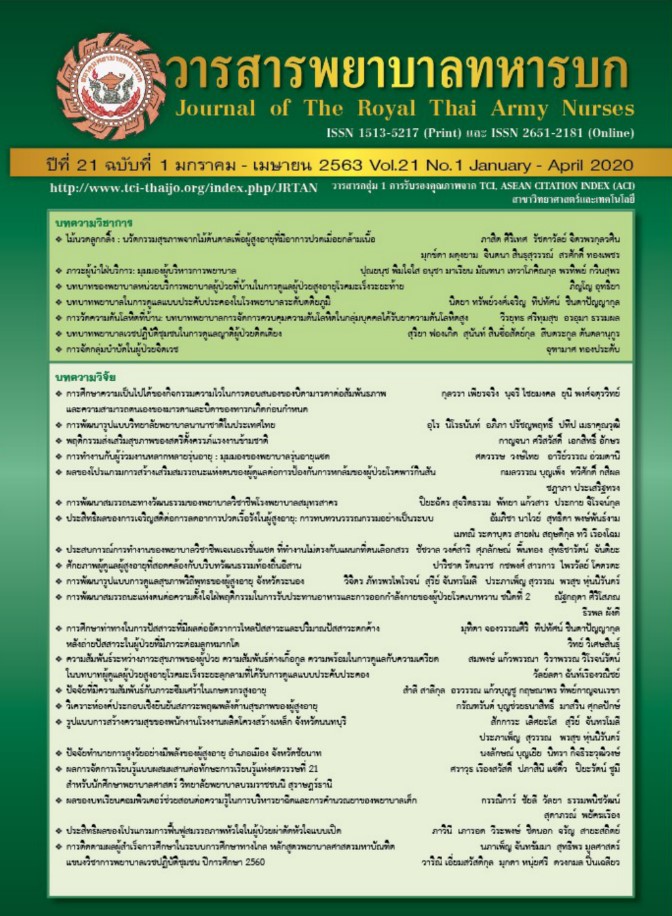Development of Self-efficacy to Diet and Exercise Behaviors Intention of Type 2 Diabetes Mellitus Patients
Keywords:
Development of self-efficacy, Diet and exercise behaviors intention, Diabetes Mellitus Type 2 PatientsAbstract
This quasi-experimental aimed to study the development of self-efficacy to diet and exercise behaviors intention of type 2 diabetes mellitus patients. Self-Efficacy Theory was used as a conceptual framework in this study. The study groups were 30 persons with diabetes mellitus type 2 which ages 30 years and over and received medical care at Pathum Thani hospital, Pathum Thani Province. Participants were simple random sampling to either the experimental group (n = 30). The experimental group received the development of self-efficacy to diet and exercise behaviors intention program include 2 activity are 1) dietary of type 2 diabetes such as media lectures, food menu selection and brainstorming about outcome expectation in diet. And 2) dietary of type 2 diabetes such as media lectures and manuals for diabetics, optimal exercise and inappropriate exercise game for diabetics, exercise plan and brainstorming about outcome expectation in exercise. Data was collected at before and after implementing the program. Data analyzed by using Descriptive statistics and paired t-test.
The study results showed that after participating in the development of self-efficacy to diet and exercise behaviors intention program, the experimental group had higher mean scores in perceived selfefficacy to diet and exercise behaviors than before participating in the program significant (p<.05). It concludes that the program developed by the researcher can effectively promote self-efficacy to diet and exercise behaviors intention program among patients with diabetes mellitus type 2.
Downloads
References
2. Rattarasan, C. Diabetes Disease in Thailand. Bangkok: Endocrinology and Metabolism Faculty of Medicine Ramathibodi Hospital;2013. (in thai).
3. Bureau of Non Communicable Disease and Ministry of Public Health [Internet]. The non-communicable diseases and injuries, 2007-2014. [update 2015; cited 2016 Sep 20] Available from Ministry of Public Health. (in thai).
4. Tongpeth. J. Effectiveness of Self - Management Promoting Potential Program on Blood Sugar Control and Quality of Life Among Diabetes Mellitus Type 2 Patients. Journal of The Royal Thai Army Nurses, 2013; 14 (2): 69-78. (in Thai)
5. Tripathy, Bb., Chandalia, H.B., & Das, A.K. RSSDI Textbook of Diabetes Mellitus. London: Jaypee Brothers Medical Publishers (P) LTD; 2012.
6. Rebekah J.W, Gebregziabher M, Martin-Harris B, & Egede L.E. Quantifying Direct Effects of Social Determinants of Health on Glycemic Control
in Adults with Type 2 Diabetes. Diabetes Technology & Therapeutics, 2015; 10 (1089):80–87.
7. Phungdee T. The Effectiveness of Exercise Behaviors Promotion Program of Diabetes Mellitus Type 2 Patients. Journal of The Royal Thai Army Nurses, 2017; 18 (Supplement):291-298. (in Thai)
8. Chanchisri A. Effects of The Self Efficacy Program on Blood Sugar Control Behavior of Diabetes Mellitus Patients. Master of Public Health [Thesis]. Rajabhat Rajanagarindra University; 2013. (in Thai).
9. Thammaraksa P. The Effectiveness of Health Education Program Applying Self-Efficacy Theory in Diabetes Mellitus Patients at Health Center in Bangkok Metropolitan. Master of Health Education [Thesis]. Srinakharinwirot University; 2011. (in Thai).
10. Weerarattanakul W, Suteetron B, & Sarsat S. Effects of Communication by Registered Nursesin Improving in the Health Behaviors of Diabetic Patients. Journal of The Royal Thai Army Nurses, 2010; 11 (1): 73-78. (in Thai)
11. Heijden M, Pouwer F, Romeijnders A.C, & Pop V.JM. Testing the effectiveness of a self-efficacy based exercise intervention for inactive people
with type 2 diabetes mellitus: design of a controlled clinical trial. BioMed Central Public Health, 2012; 12 (331): 1-8.
Downloads
Published
How to Cite
Issue
Section
License
บทความหรือข้อคิดเห็นใดใดที่ปรากฏในวารสารพยาบาลทหารบกเป็นวรรณกรรมของผู้เขียน ซึ่งบรรณาธิการหรือสมาคมพยาบาลทหารบก ไม่จำเป็นต้องเห็นด้วย
บทความที่ได้รับการตีพิมพ์เป็นลิขสิทธิ์ของวารสารพยาบาลทหารบก
The ideas and opinions expressed in the Journal of The Royal Thai Army Nurses are those of the authors and not necessarily those
of the editor or Royal Thai Army Nurses Association.






